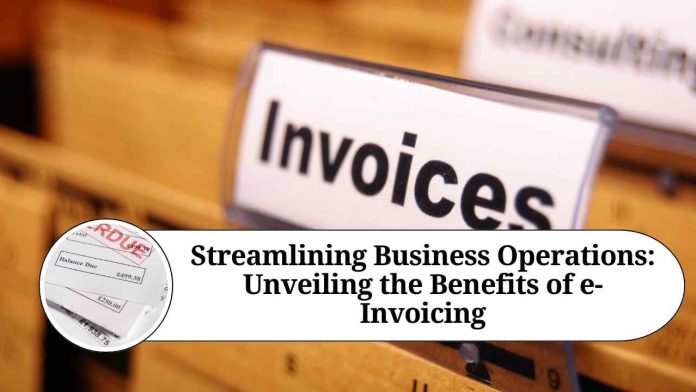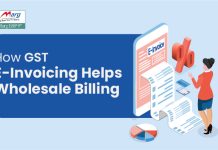Introduction
In today’s rapidly evolving digital landscape, businesses are constantly seeking innovative solutions to optimize their operations and enhance efficiency. One such transformational tool that has gained significant traction is electronic invoicing, popularly known as e-invoicing. This blog aims to shed light on the myriad benefits of e-invoicing and how it can revolutionize traditional invoicing processes.
- Enhanced Efficiency: Manual invoice processing can be time-consuming and error-prone. E-invoicing automates the entire invoicing cycle, eliminating the need for manual data entry and reducing the chances of errors. By integrating seamlessly with existing systems and software, e-invoicing accelerates the entire process, from invoice creation to approval and payment. This streamlined approach leads to faster invoice processing and improved cash flow management.
- Cost Savings: Traditional paper-based invoicing incurs costs associated with printing, postage, and storage. Adopting e-invoicing eliminates these expenses, allowing businesses to significantly reduce administrative costs. Additionally, the automation and elimination of manual tasks free up valuable human resources, enabling them to focus on more strategic initiatives.
- Increased Accuracy: Human error is inevitable when manually entering data from paper invoices. E-invoicing minimizes errors by automating the process, ensuring accurate data entry and reducing the risk of mistakes. With the ability to validate and reconcile invoices in real-time, businesses can maintain error-free financial records and facilitate smooth audits.
- Improved Cash Flow Management: E-invoicing expedites the payment process by reducing the time between issuing an invoice and receiving payment. Real-time tracking of invoice statuses allows businesses to promptly follow up on outstanding invoices, reducing delays in payment cycles. This improved cash flow management provides better financial stability and enables businesses to meet their obligations promptly.
- Enhanced Supplier Relationships: Efficient invoicing processes positively impact supplier relationships. E-invoicing enables seamless integration with suppliers’ systems, resulting in faster invoice submission, verification, and payment. Prompt payment and streamlined communication build trust and strengthen long-term partnerships, allowing businesses to negotiate favorable terms and discounts.
- Compliance and Security: E-invoicing helps businesses ensure compliance with regulatory requirements and tax laws. Automated validation of invoice data ensures accuracy, reducing the risk of compliance errors and potential penalties. Additionally, e-invoicing platforms offer robust security measures, such as encryption and authentication protocols, to protect sensitive financial information and prevent fraudulent activities.
- Sustainability and Environmental Responsibility: The environmental impact of paper-based invoicing is significant, with the associated deforestation, energy consumption, and carbon emissions. Embracing e-invoicing contributes to sustainable practices by eliminating paper waste and reducing carbon footprints. It aligns businesses with environmentally responsible initiatives and enhances their corporate social responsibility (CSR) profiles.
Conclusion
The transition from traditional invoicing to e-invoicing brings about a host of benefits that can positively transform business operations. The enhanced efficiency, cost savings, increased accuracy, improved cash flow management, strengthened supplier relationships, compliance adherence, and sustainability advantages make e-invoicing an indispensable tool for modern businesses. By embracing this digital transformation, organizations can unlock new levels of productivity, profitability, and sustainability while remaining competitive in an ever-evolving marketplace.
Read more useful content:
Frequently Asked Questions (FAQs)
Q1: What is e-invoicing?
A1: E-invoicing, or electronic invoicing, is the process of creating, transmitting, and receiving invoices in a digital format instead of using traditional paper-based methods. It involves the automated exchange of invoice data between business systems, streamlining the invoicing process.
Q2: What are the key benefits of adopting e-invoicing?
A2: Some of the key benefits of e-invoicing include enhanced efficiency, cost savings, increased accuracy, improved cash flow management, strengthened supplier relationships, compliance adherence, and environmental sustainability.
Q3: How does e-invoicing enhance efficiency?
A3: E-invoicing automates the entire invoicing cycle, eliminating manual data entry and reducing errors. It integrates seamlessly with existing systems, accelerates invoice processing, and enables faster approval and payment, thus improving overall efficiency.
Q4: Can e-invoicing save costs for businesses?
A4: Yes, e-invoicing can result in significant cost savings. It eliminates expenses associated with printing, postage, and storage of paper invoices. Moreover, the automation of manual tasks frees up human resources, allowing them to focus on more strategic activities.
Q5: How does e-invoicing improve accuracy?
A5: Manual data entry from paper invoices is prone to human errors. E-invoicing minimizes errors by automating the process and ensuring accurate data entry. Real-time validation and reconciliation of invoices further contribute to maintaining error-free financial records.
Q6: How does e-invoicing improve cash flow management?
A6: E-invoicing reduces the time between issuing an invoice and receiving payment. Real-time tracking of invoice statuses allows businesses to follow up on outstanding invoices promptly. This improved cash flow management enhances financial stability and helps meet financial obligations on time.
Q7: Can e-invoicing strengthen supplier relationships?
A7: Yes, e-invoicing can positively impact supplier relationships. It enables seamless integration with suppliers’ systems, resulting in faster invoice submission, verification, and payment. Prompt payment and streamlined communication build trust and strengthen long-term partnerships.
Q8: Does e-invoicing help with compliance and security?
A8: Absolutely. E-invoicing helps ensure compliance with regulatory requirements and tax laws. Automated validation of invoice data reduces the risk of compliance errors and penalties. E-invoicing platforms also offer robust security measures, such as encryption and authentication protocols, to protect sensitive financial information.
Q9: How does e-invoicing contribute to sustainability?
A9: E-invoicing promotes environmental sustainability by eliminating paper waste associated with traditional invoicing. It reduces the carbon footprint and energy consumption related to paper production, transportation, and storage. Embracing e-invoicing aligns businesses with sustainable practices and enhances their corporate social responsibility profiles.
Q10: Is it complicated to transition from traditional invoicing to e-invoicing?
A10: While transitioning to e-invoicing requires initial setup and integration with existing systems, it is a manageable process with the help of e-invoicing service providers. They offer user-friendly interfaces, support, and guidance throughout the implementation process, ensuring a smooth transition for businesses.




















